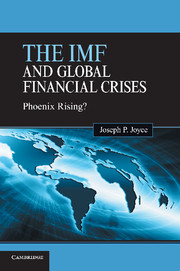Book contents
- Frontmatter
- Contents
- List of Figures, Tables, and Boxes
- Preface
- Acknowledgments
- Abbreviations
- 1 Introduction
- 2 Bretton Woods
- 3 Transitions
- 4 The Debt Crisis
- 5 Global Finance Redux
- 6 Currency Crises
- 7 The Widening Gyre
- 8 Fiscal Follies
- 9 Lessons Learned
- 10 The Great Recession
- 11 The World Turned Upside Down
- Appendix: IMF Data
- References
- Index
10 - The Great Recession
Published online by Cambridge University Press: 05 December 2012
- Frontmatter
- Contents
- List of Figures, Tables, and Boxes
- Preface
- Acknowledgments
- Abbreviations
- 1 Introduction
- 2 Bretton Woods
- 3 Transitions
- 4 The Debt Crisis
- 5 Global Finance Redux
- 6 Currency Crises
- 7 The Widening Gyre
- 8 Fiscal Follies
- 9 Lessons Learned
- 10 The Great Recession
- 11 The World Turned Upside Down
- Appendix: IMF Data
- References
- Index
Summary
The era of economic stability that prevailed during the middle 2000s came to an end with the Great Recession of 2008–9. The shock emanating from the United States and other advanced economies swept through the global economy, contracting trade and financial flows and depressing economic activity. This chapter describes the IMF’s attempts to avert a crisis and its response when the collapse occurred.
The “Great Moderation,” described in the first section, was characterized by declines in inflation and output volatility in most nations. Moreover, growth rates accelerated in the emerging market economies. The one discordant note was the increase in current account deficits in several advanced economies, most notably the United States. These were matched by surpluses in many emerging market economies as well as the oil exporters, which were accompanied by increased foreign exchange reserves. The reasons for and implications of these “global imbalances” have been widely debated. Some viewed them as the result of the transfer of funds from emerging nations with high savings rates to advanced economies with liquid financial markets and did not believe that they posed a threat to international financial stability. Others emphasized the role of diminished private and public savings in the advanced economies that left those nations vulnerable to capital outflows.
- Type
- Chapter
- Information
- The IMF and Global Financial CrisesPhoenix Rising?, pp. 153 - 180Publisher: Cambridge University PressPrint publication year: 2012



